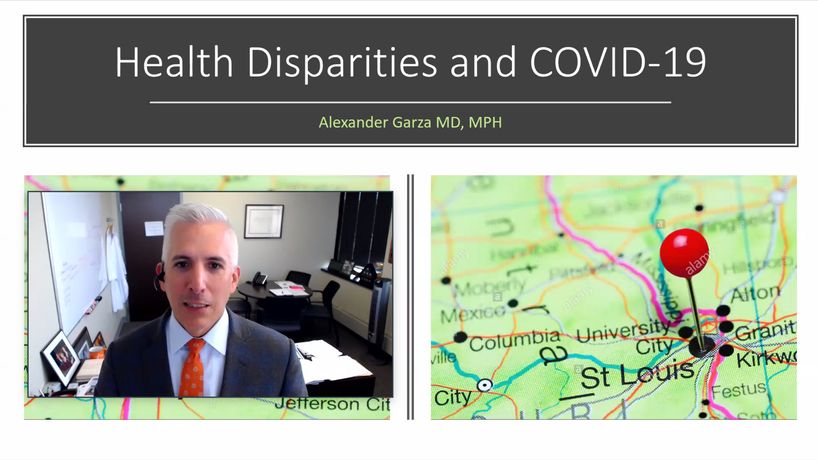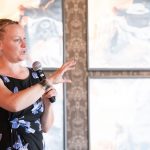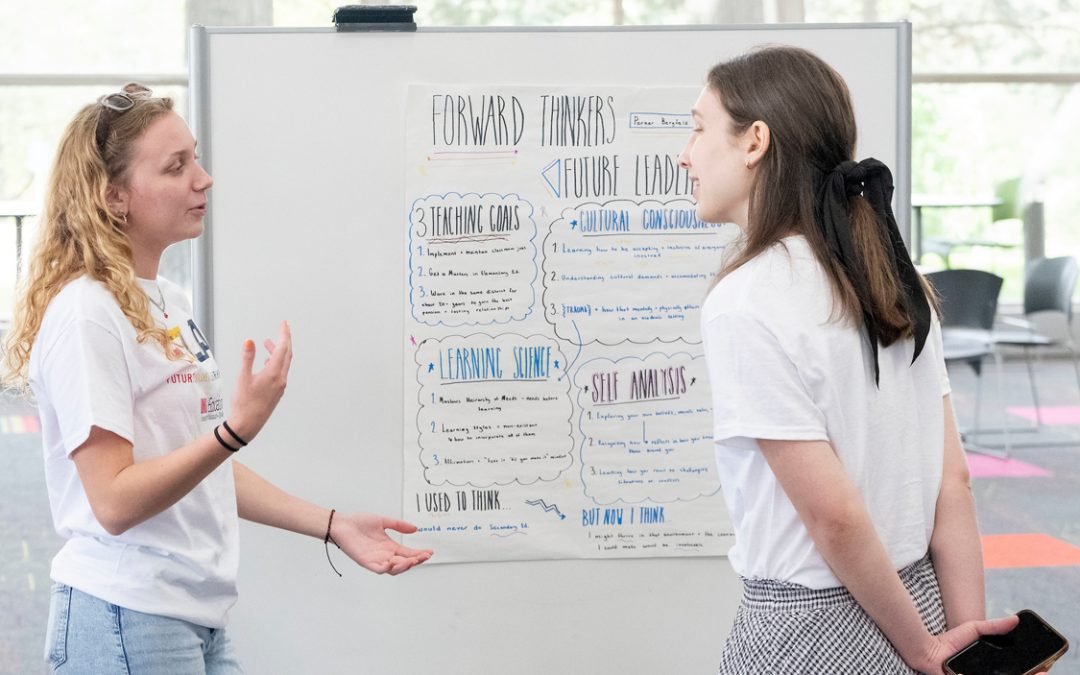
Alexander Garza offered the keynote address at the virtual “UniverCities Exchange” event. He examined health disparities related to COVID-19 in St. Louis and Kansas City. (Screenshot from UniverCities Exchange event)
When Alexander Garza’s article “Guns, Germs and Health Care,” which focused on pandemics, was published last December in Health Progress, the journal of the Catholic Health Association of the United States, he had no idea how relevant the topic would become.
Within a few months of publication, nations around the world enacted stay-at-home orders and industries were temporarily shut down as COVID-19 became the most destructive pandemic in a century.
On Wednesday morning, the University of Missouri–St. Louis and the University of Missouri–Kansas City joined forces to examine “Health Disparities in the Time of COVID-19” at the inaugural event of the virtual “UniverCities Exchange” series. The UniverCities Exchange is a collaboration between the two universities that explores significant issues faced by both St. Louis and Kansas City.
Garza, the chief community health officer of SSM Health and task force commander for the St. Louis Metropolitan Pandemic Task Force, offered the keynote address, which was followed by a panel and question-and-answer session. Panelists were Diego Abente, president and CEO of Casa de Salud; Jannette Berkley-Patton, professor of biomedical and health informatics at the UMKC School of Medicine; Riisa Rawlins-Easley, chief of staff for the St. Louis Regional Health Commission; and Qiana Thomason, president and CEO of the Health Forward Foundation. Steve Kraske, host of “Up to Date” on KCUR, served as the moderator.
Maps tracking the spread of COVID-19 show the pandemic is rampant in the Midwest, and Missouri has been designated as a hot spot. In St. Louis County, more than 25,000 people have contracted COVID-19 over the course of the pandemic and more than 800 died as a result.
Garza pointed out that African Americans are more than four times as likely to test positive for the virus than white populations and nearly 2.5 times more likely to be hospitalized. In St. Louis, COVID-19 has resulted in the deaths of 55 out of every 100,000 Black persons and 15 out of every 100,000 non-Black persons.
“The people that were put at the highest risk are the people that have the least resources in order to maintain stability, whether that’s income or being able to shelter in place at home,” he said.
Garza stressed that health disparities are not rooted solely in medical care but are the result of a combination of factors, including socioeconomic factors and one’s environment.
“It’s not so much health disparities but social and economic disparities that actually produce the health disparities,” he said. “If we ever want to come across a solution to a pandemic, we have to address these things first.”
During the panel that followed Garza’s address, participants discussed ways to address health disparities and provide solutions to stem the spread of COVID-19. The conversation focused on the need to develop trust within underrepresented communities so health-related messaging will be received.
One significant obstacle is recipients not being able to understand the messages. Thus, messaging must be catered to the community for which it’s intended in order to be successful.
“In particular for folks whose first language isn’t English and whose first culture, if you will, is not the culture of the United States, we’ve got to understand that our response needs to be multifaceted and needs to be diverse and inclusive of these different cultures,” Abente said.
Panelists pointed out that local leaders can provide support to develop trust within underrepresented communities. As vaccines become available, those leaders will be key to communicating the importance and safety of the vaccine to community members.
“If there was ever a time that we needed to put into play the use of our community health workers, our lay health workers, those people who can interact directly with community members, this would be the time to be able to build that trust,” Berkley-Patton said. “We have to be really strategic in who is delivering those messages. Those messages need to come from people that are highly trusted, people that others are interacting with often.”
The next UniverCities Exchange webinar will focus on abandoned structures in St. Louis and Kansas City. The date for the event is still to be determined.
View the full webinar below.














